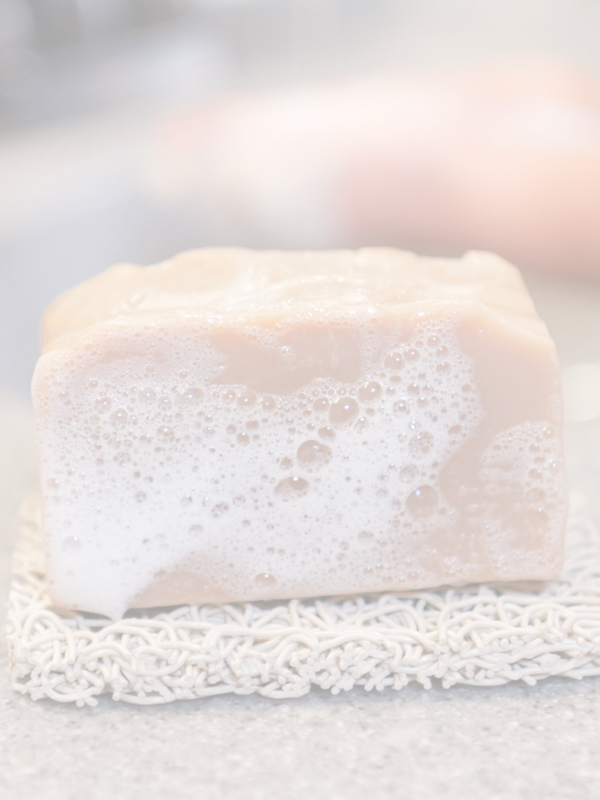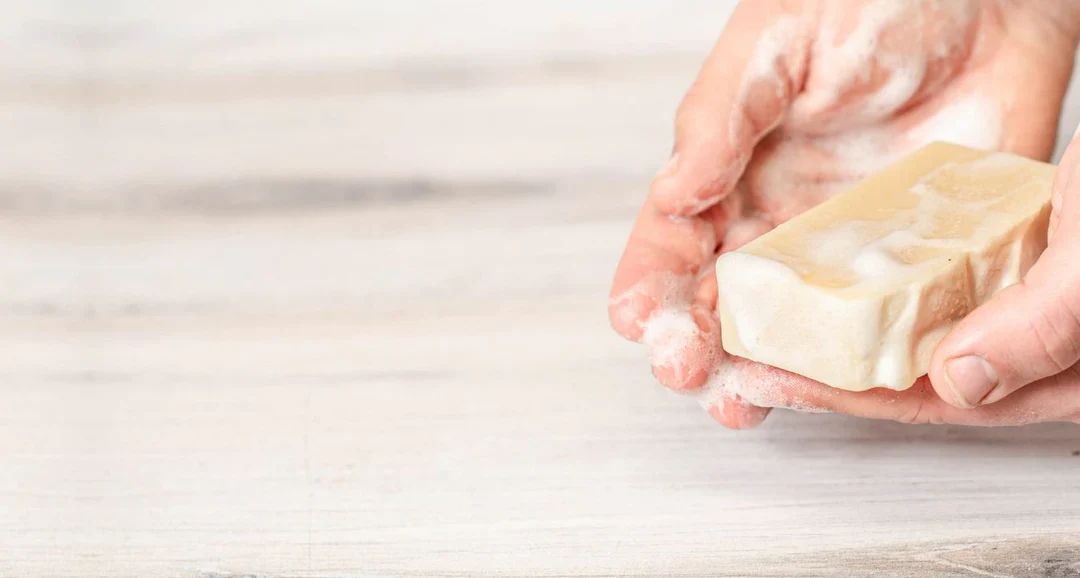Goat Milk Bar Soaps
-

Purity
Goat Milk Soap UnscentedRegular price $6.79Regular priceUnit price / per -

Oatmeal Milk & Honey
Goat Milk SoapRegular price $6.79Regular priceUnit price / per -

Lavender
Goat Milk SoapRegular price $6.79Regular priceUnit price / per -

Tea Tree
Goat Milk SoapRegular price $6.79Regular priceUnit price / per -

Calendula
Olive Oil Goat Milk SoapRegular price $7.79Regular priceUnit price / per -

Almond
Goat Milk SoapRegular price $6.79Regular priceUnit price / per -

Black Raspberry
Goat Milk SoapRegular price $6.79Regular priceUnit price / per -

Castile
Olive Oil Goat Milk SoapRegular price $10.79Regular priceUnit price / per -

Honeysuckle
Goat Milk SoapRegular price $6.79Regular priceUnit price / per -

Ocean
Goat Milk SoapRegular price $6.79Regular priceUnit price / per -

Activated Bamboo Charcoal
Goat Milk SoapRegular price $7.99Regular priceUnit price / per -

Lemongrass
Goat Milk SoapRegular price $6.79Regular priceUnit price / per -

Frankincense & Myrrh
Goat Milk SoapRegular price $6.79Regular priceUnit price / per -

Thieves Defense
Goat Milk SoapRegular price $6.79Regular priceUnit price / per -

Clean Cotton
Goat Milk SoapRegular price $6.79Regular priceUnit price / per -

Sandalwood
Goat Milk SoapRegular price $6.79Regular priceUnit price / per
Americans Agree These Are The Best Farm-Fresh Soaps for Soft Skin
250,000+ happy customers can't be wrong!
-
Oatmeal Milk & Honey Goat Milk Soap
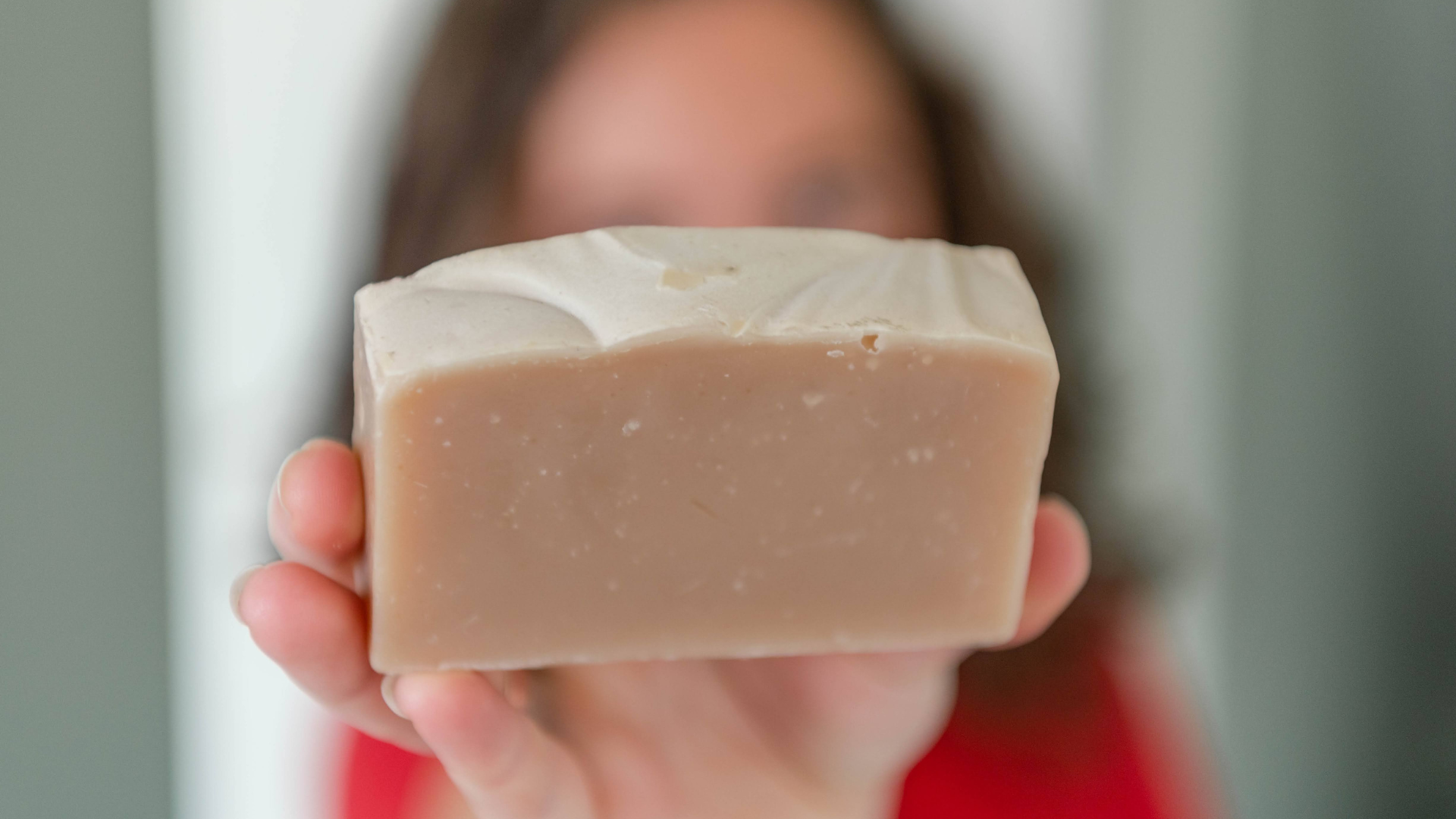
Relieves very dry, itchy skin
"The Oatmeal milk & Honey relieves my very dry, itchy skin making it softer and more moisturized. I even use less body lotion. Reminds me of when I was a small child to when mom would have to get that oatmeal powder for my baths because of my very sensitive skin. At 72 I still have very sensitive skin. My Dermatologist told me to switch to Dove and I said absolutely NOT. Goat Milk Stuff works better!"
Ulanda L. ✅ Verified Buyer
Shop Now -
Tea Tree Goat Milk Soap
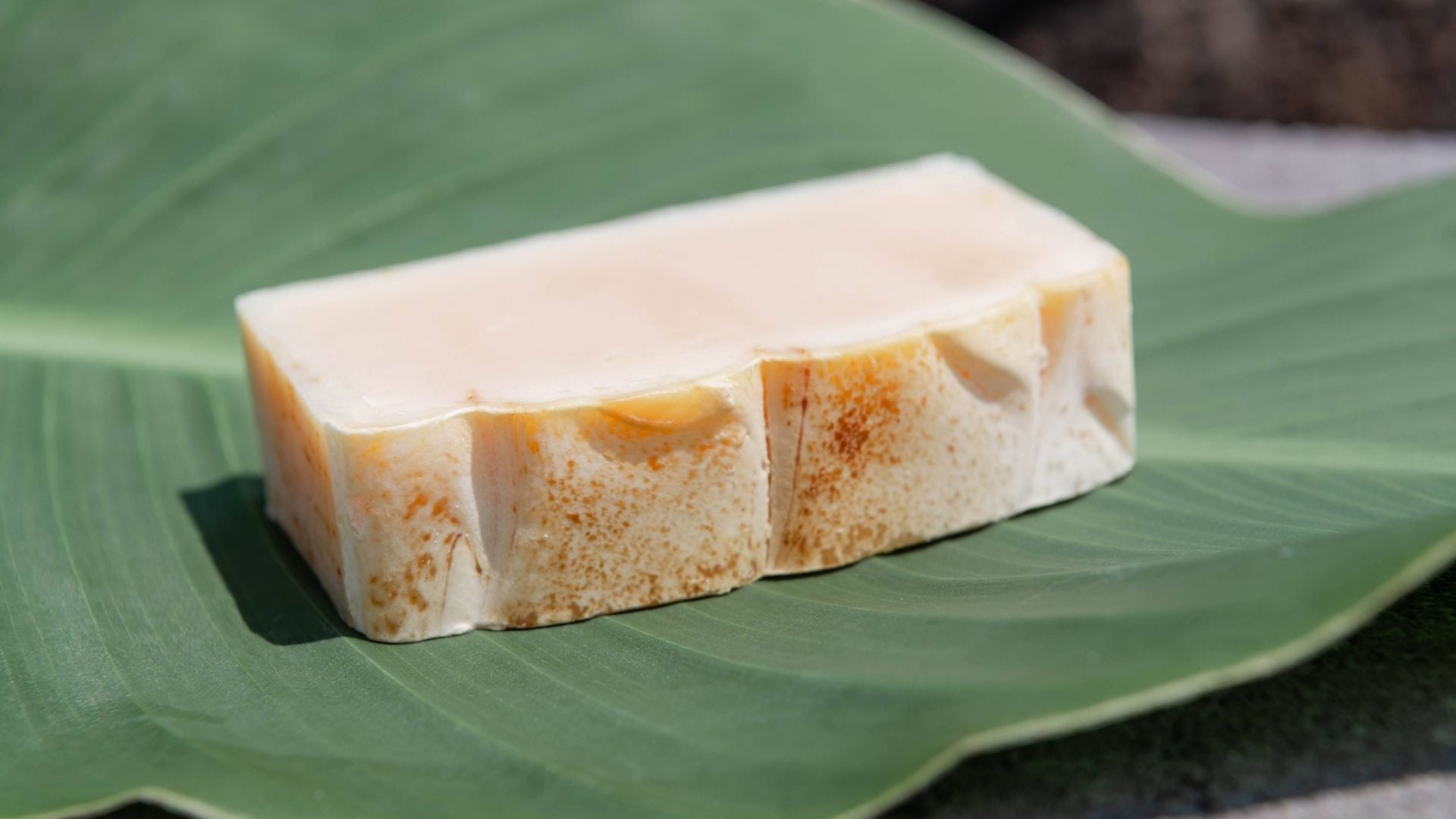
I feel fresh all day
"The tea tree soap softens, soothes, and leaves you fresh and clean. The soaps moistures wonderfully. I am a gardener, and it soothes irritations immediately. It also deodorizes better than any soap I’ve ever used. I feel fresh all day. Amazing! My husband loves it, too. He requested his own bar."
Kim B. ✅ Verified Buyer
Shop Now -
Lavender Goat Milk Soap
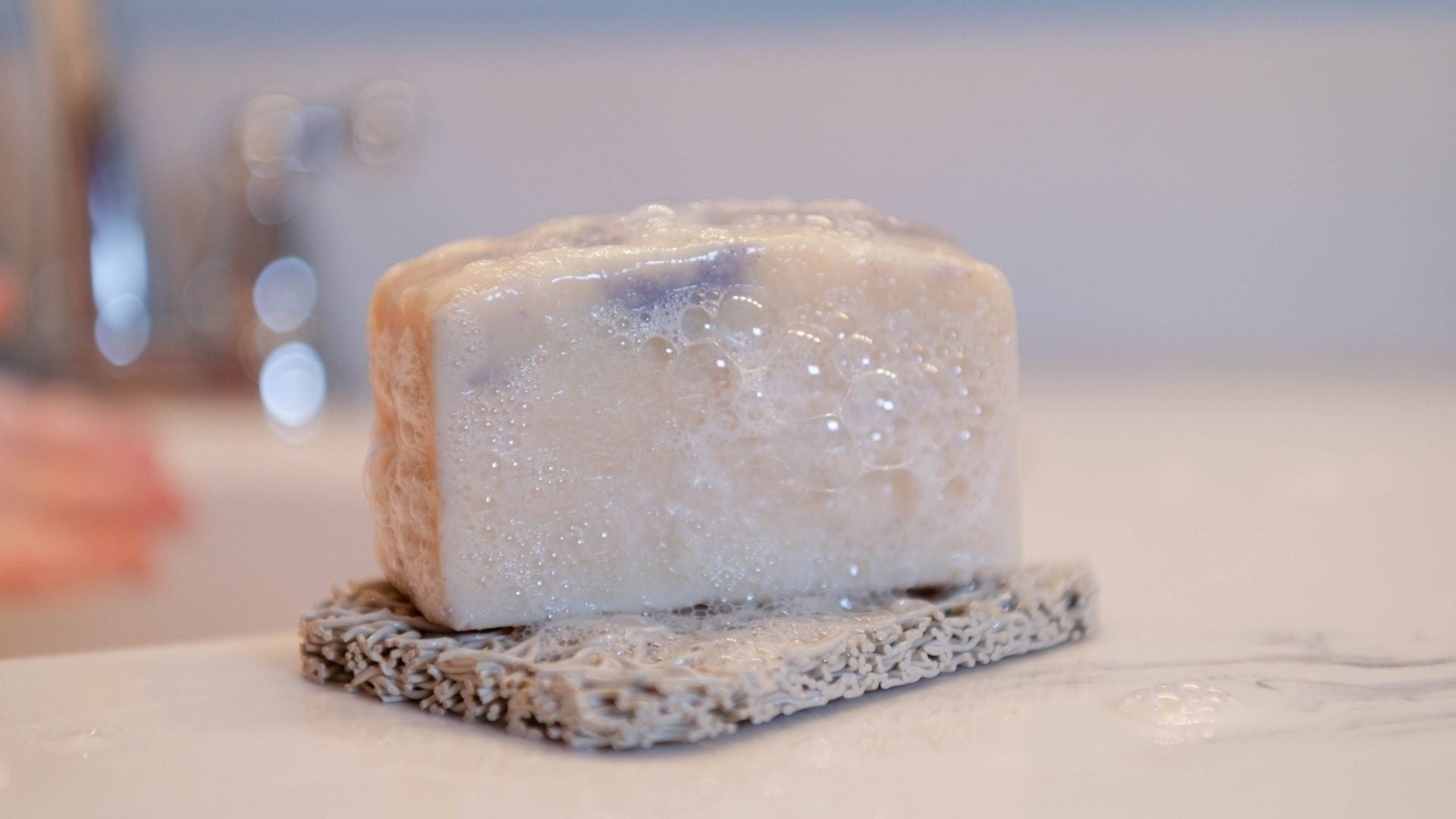
Doesn't over dry my skin
"I've been using this Lavender soap for over 3 years now. Doesn't over dry my skin, but leaves it soft and it helps prevent acne breakouts for me! Also the scent is perfect—not overwhelming. Thank you for making a great product!"
Juliet M. ✅ Verified Buyer
Shop Now -
Lavender Goat Milk Soap
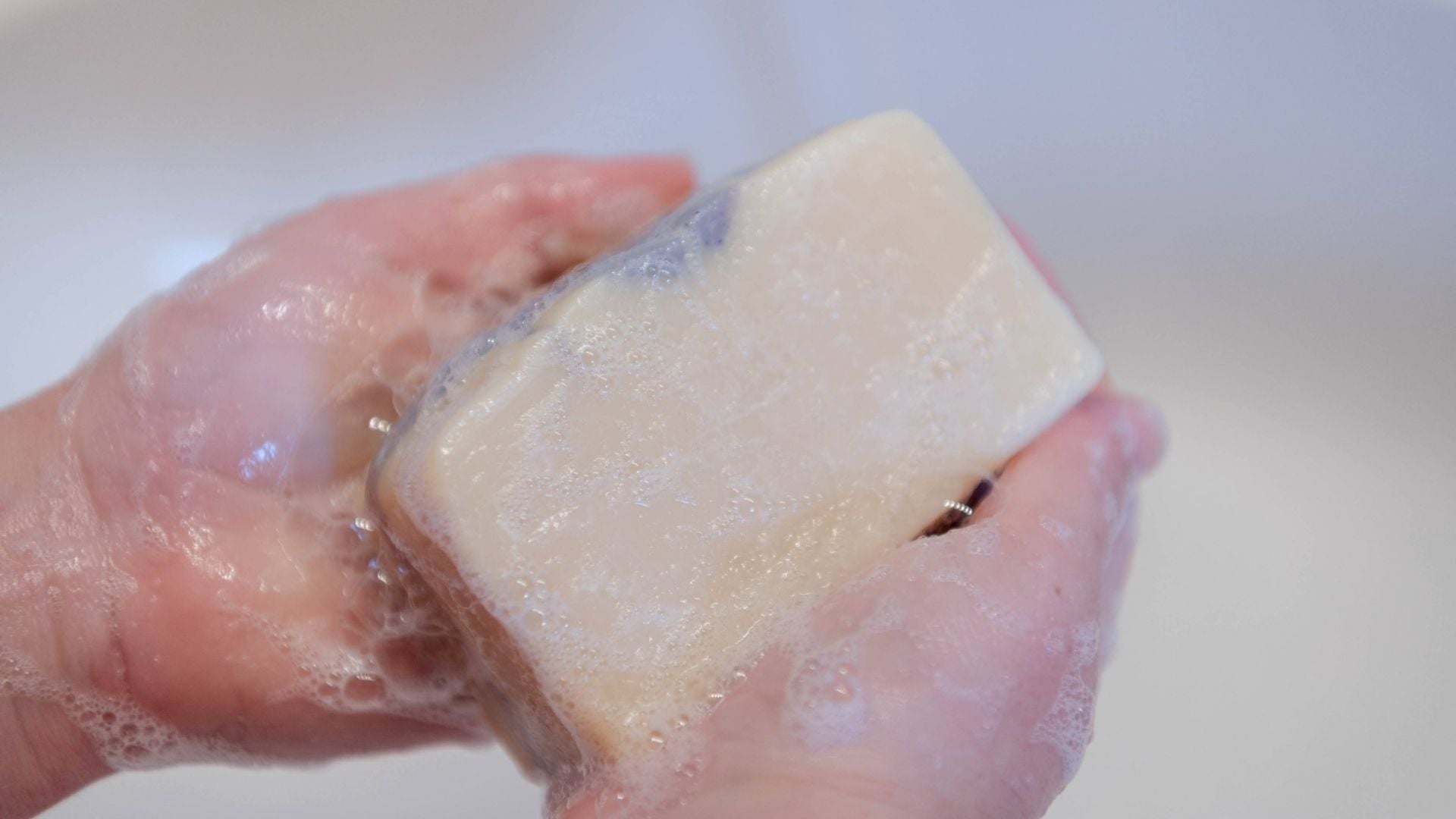
Building my 80 year old skin back up
"This is great soap. I should have used it sooner. Have itchy skin on upper back & not even medicine helped. But using the Lavender soap has helped. Also I'm older (80) & my skin on lower arms is very thin & scaly. But using the soap has started building my skin back up. Great product."
Cecilia D. ✅ Verified Buyer
Shop Now -
Turmeric Goat Milk Soap
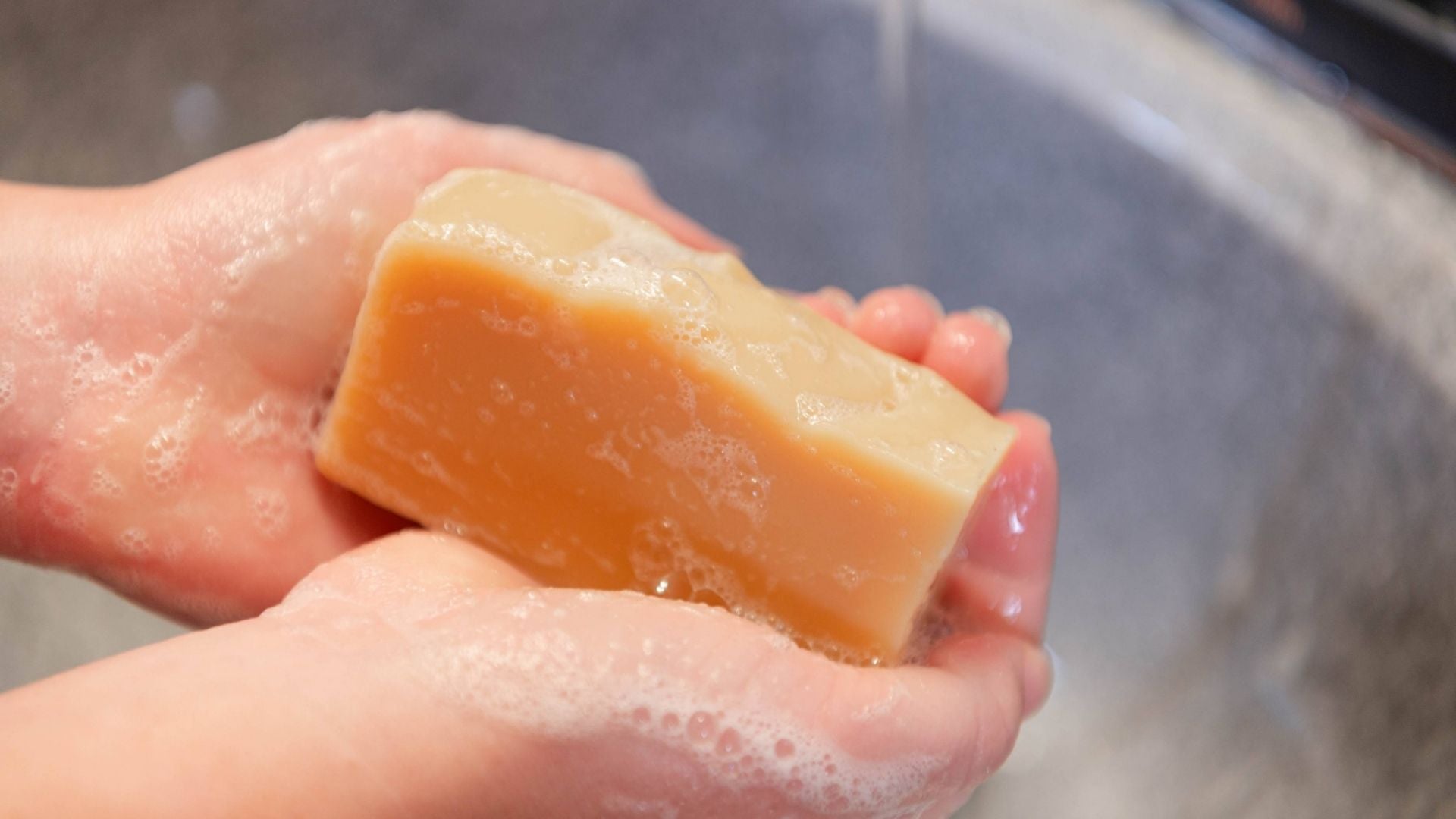
Eczema is gone
"I have been using turmeric soap to help keep my eczema at bay. I recently went on a weeklong trip and did not take my soap. Never again! My eczema had a huge flare up without it. I wasn’t real sure it was the turmeric soap that was helping before, but I know now it was. I started using it again when I returned and the eczema is gone! Thank you for this fantastic product, and all your other soaps, dish soap, laundry soap, and lotions."
Nancy ✅ Verified Buyer
Shop Now -
Rosemary Mint Goat Milk Soap
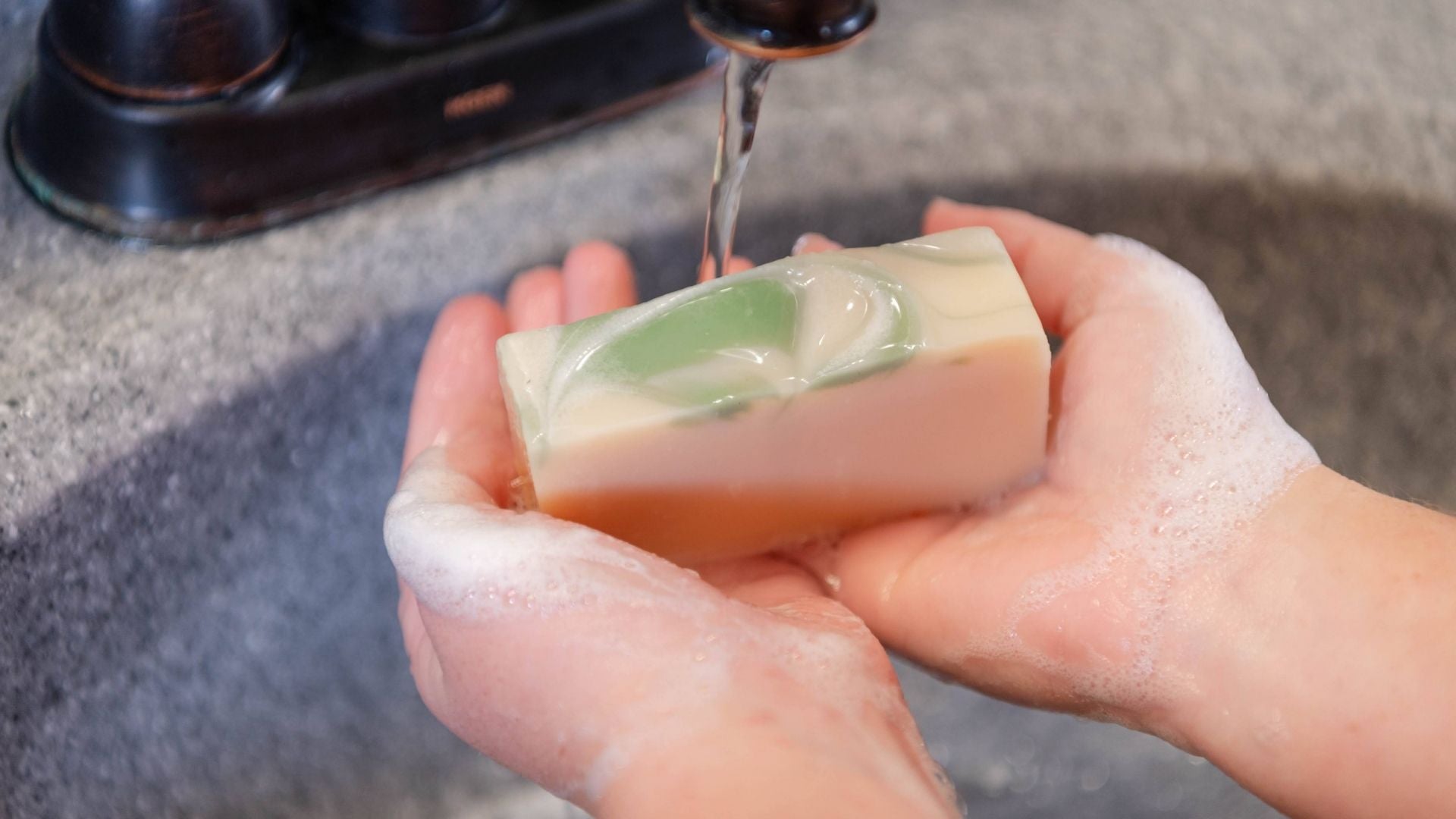
Keeps my tattoo fresh looking
"Rosemary Mint smells excellent! Used it on my healed tattoo (anyone who's ever had a tattoo knows it can dry out and look ashier than normal skin) and it keeps my tattoo moisturized and fresh looking from shower to shower! I have extremely sensitive skin too and I can use this soap to shave without getting razor burn or itching! I love it!!"
Paige ✅ Verified Buyer
Shop Now -
Jewelweed for Poison Ivy Goat Milk Soap
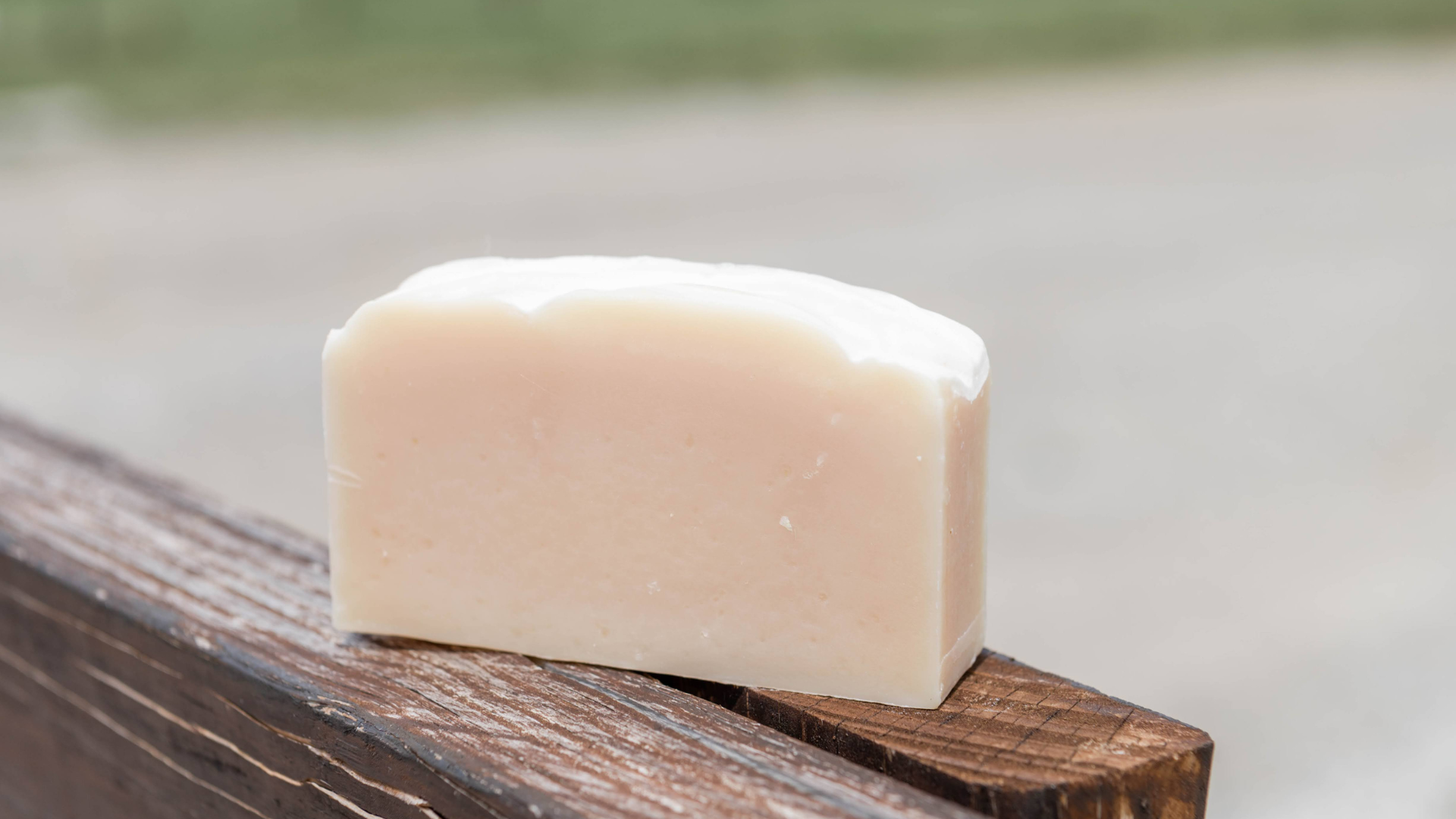
Red welts gone in 3 days!
"We ordered the jewelweed soap after my husband developed a severe poison ivy rash all over his body. Within a day of using the soap, the itching stopped, and within three days, the red welts were gone (he also used the jewelweed salve from GMS). In the past, he’s endured the rash for weeks, so this was a game-changer. He now insists we keep a stock of this soap and always have one in the shower during summer for after yard work. Thanks to this soap, we haven’t had another poison ivy outbreak, which is amazing since our property is a haven for the plant."
Sarah P. ✅ Verified Buyer
Shop Now -
Luv Spell Goat Milk Soap
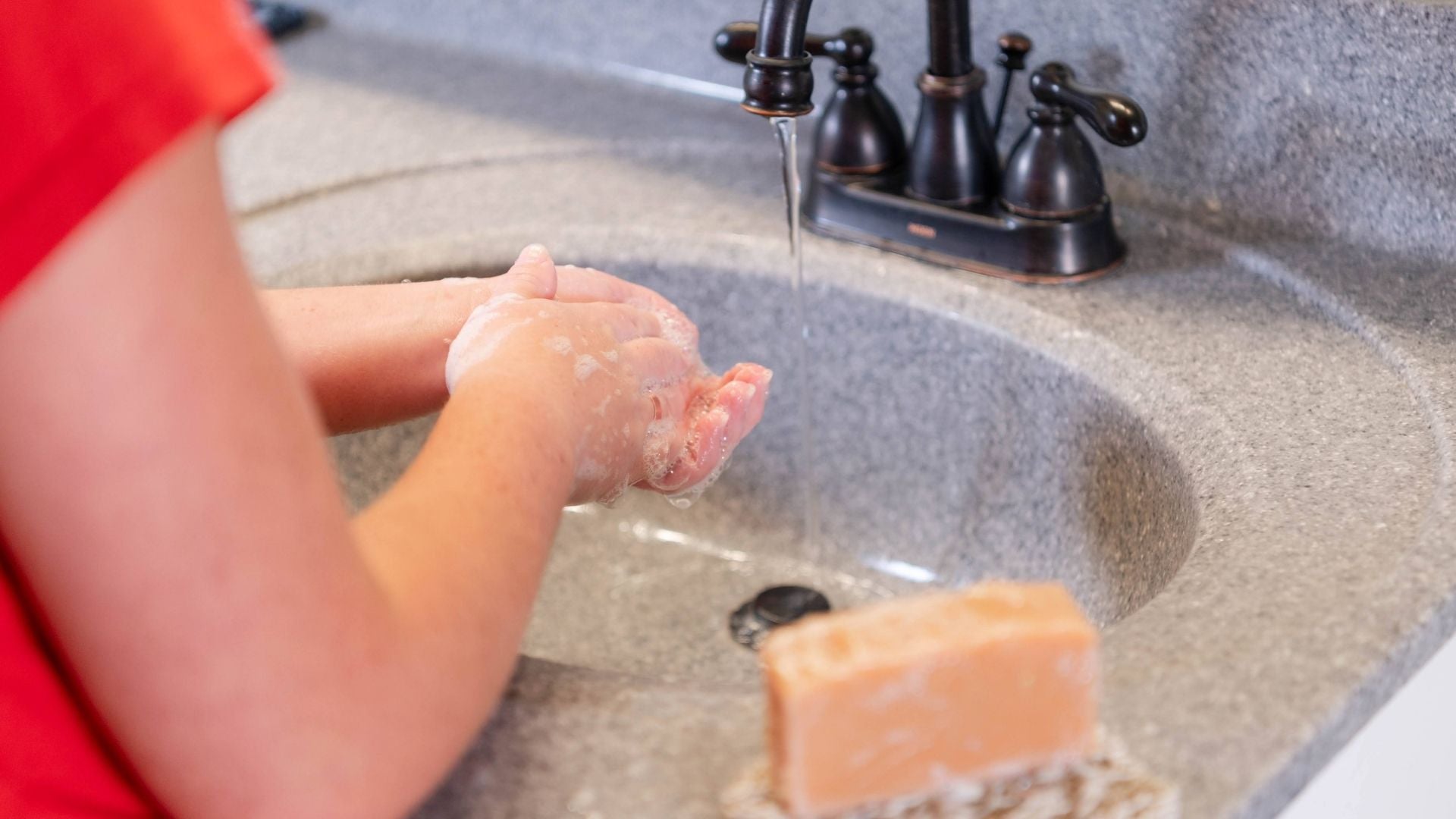
Long Lasting!
"I have switched to only using this goat milk soap because it is the only soap that doesn't make my skin dry. It feels creamy on my skin and has longevity. Luv Spell is my favorite scent. My husband can go through 2 or 3 bars of regular soap and my GMS bar is still going strong."
Debbie H. ✅ Verified Buyer
Shop Now -
Purity Goat Milk Soap Unscented
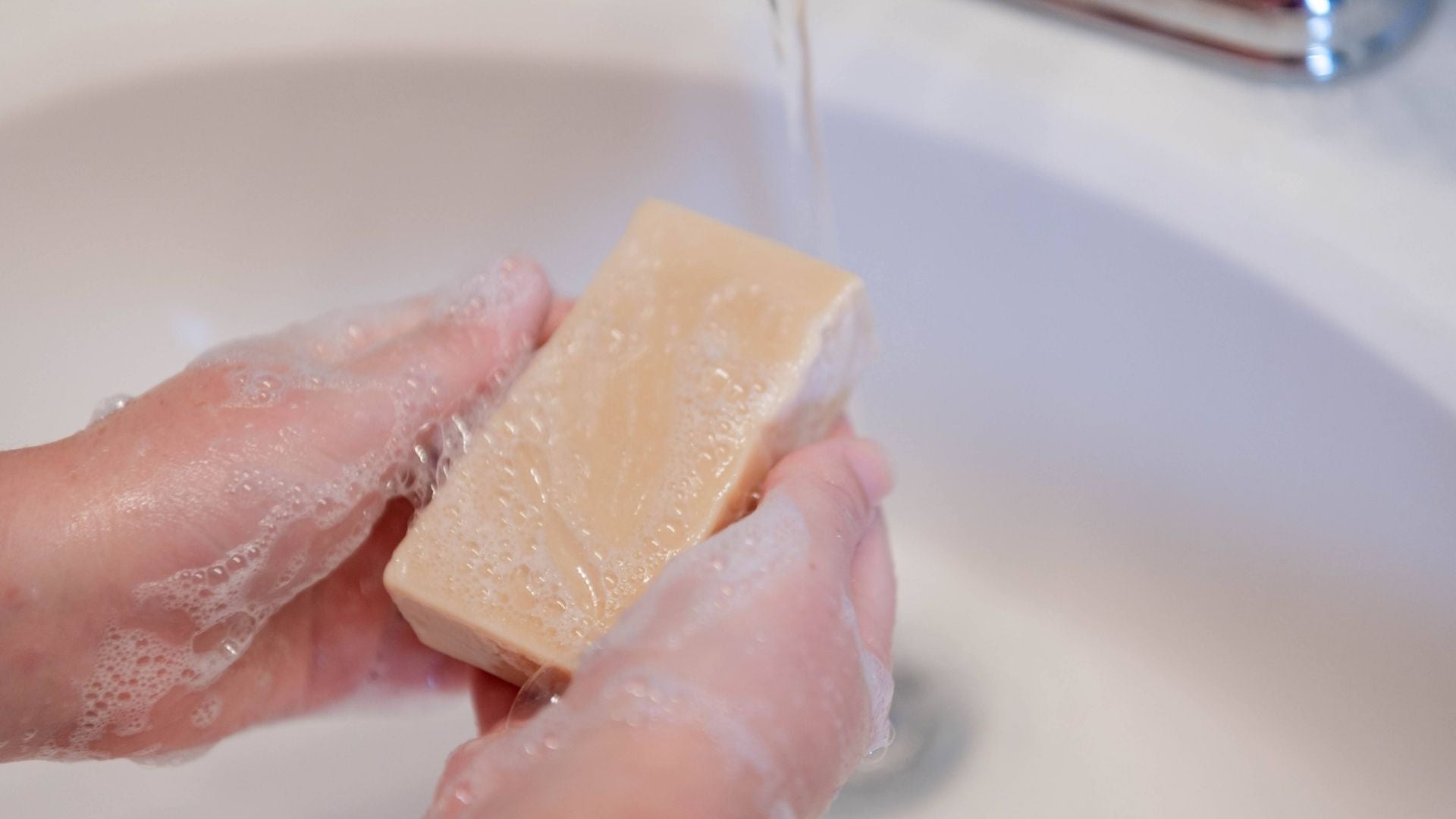
Cleared up my winter eczema
"I have really dry skin, especially on my face during the winter. I had just had a terrible reaction to a well known “dermatologist recommended” facial cleanser. One of my friends suggested GMS Purity and I didn’t think anything else about it because how could this possibly work if all the expensive, brand names didn’t? I am so glad I tried it! Within the first use my face was softer and after a couple more days it was softer than it’s ever been! It also made my winter eczema on my arms clear up! Thank you for “fixing” my skin!!"
Jeanne W. ✅ Verified Buyer
Shop Now -
Activated Bamboo Charcoal Goat Milk Soap
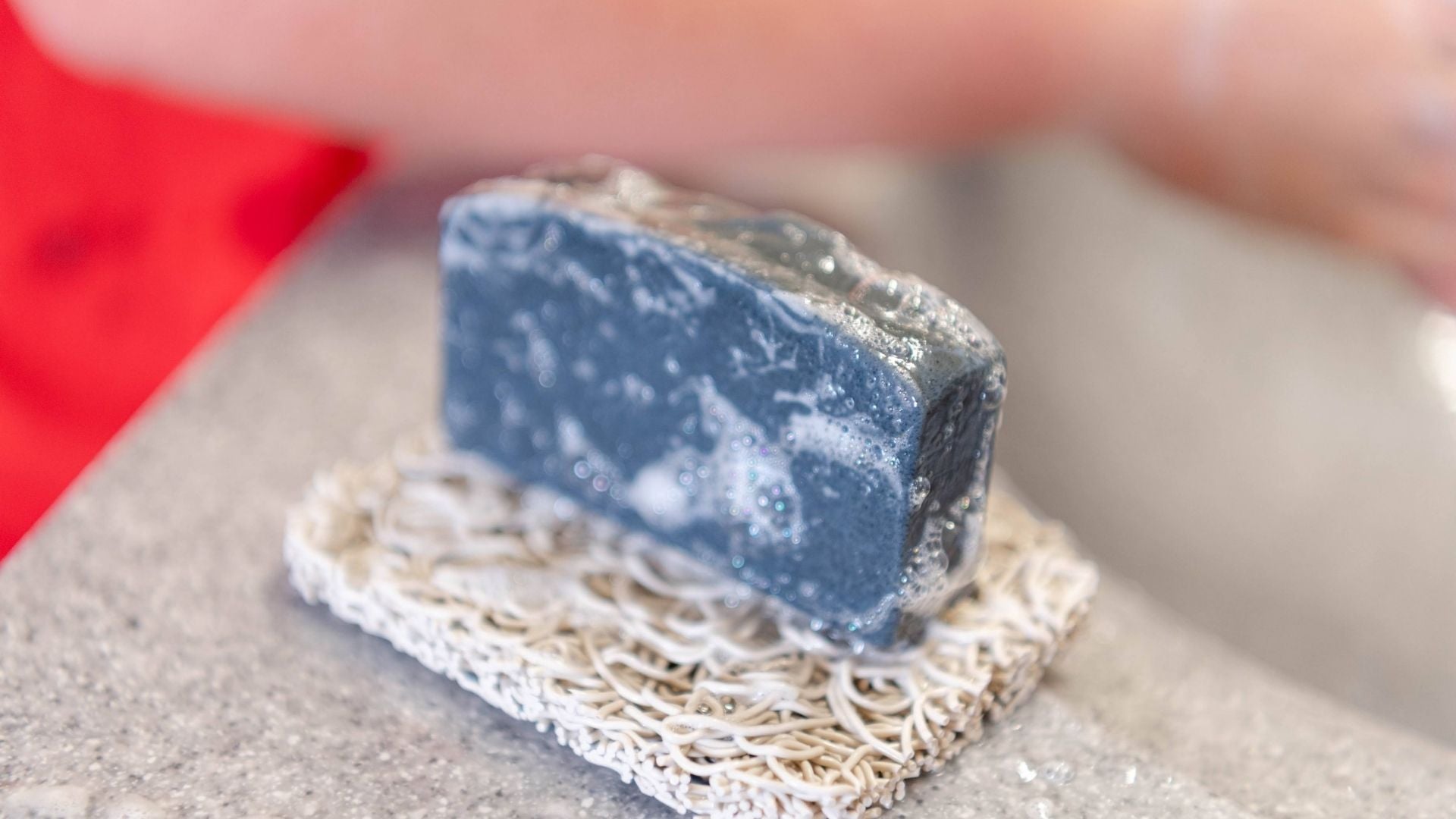
No more ashy skin!
"This is my favorite charcoal soap. I have used many different companies, but GMS is by far my favorite for soap. I do not have issues with acne anymore and it doesn’t dry my skin like other soaps. I used to get white ashy skin from other brand soaps. This particular charcoal soap eliminated my dry skin and leaves me feeling clean instead of that film other soaps leave behind. I will continue to buy this charcoal soap for my facial skin care regiment. Absolutely love it!"
Christy M. ✅ Verified Buyer
Shop Now -
Castile Olive Oil Goat Milk Soap
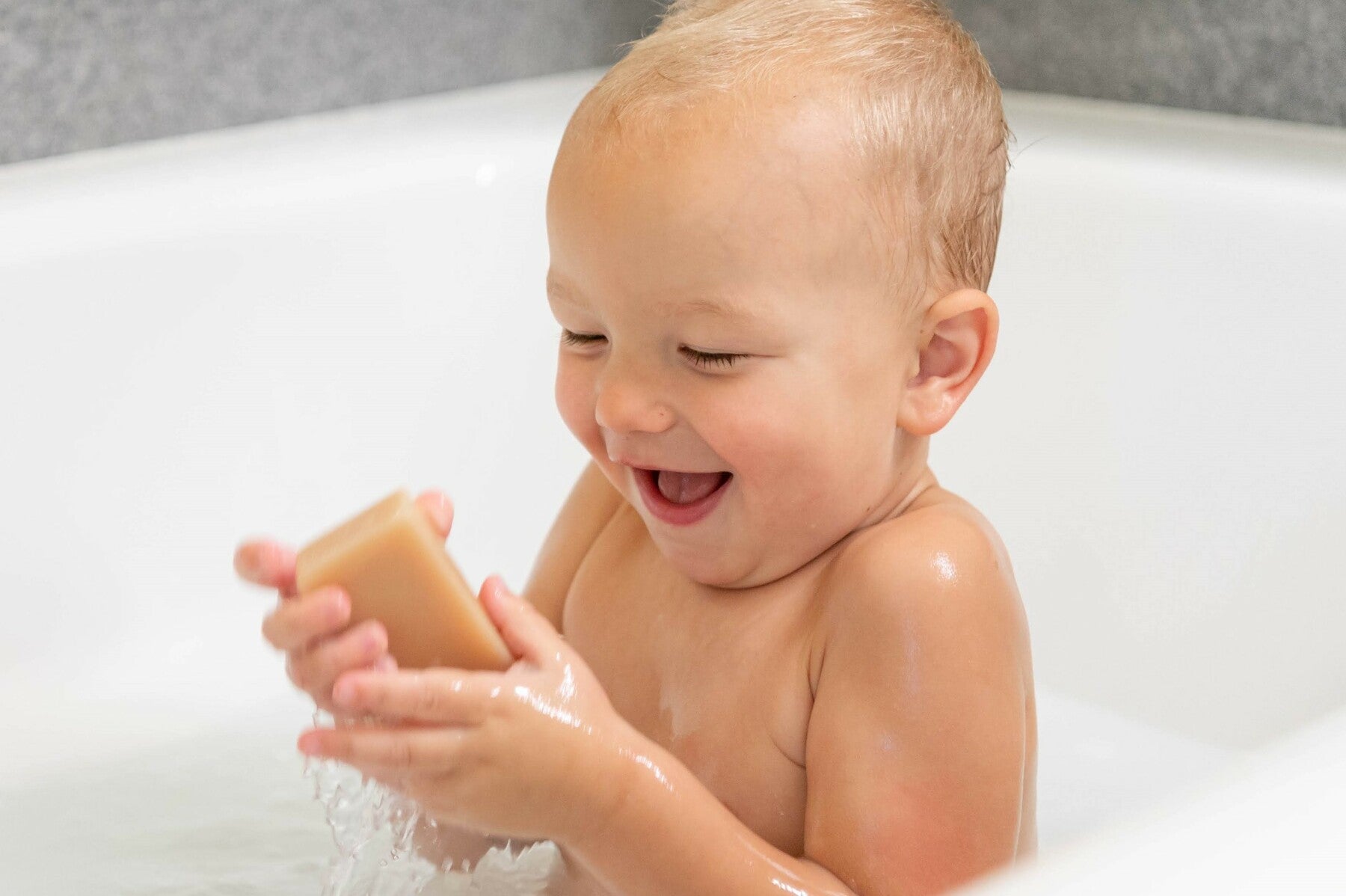
No more baby eczema flare-ups
"I love the Castile soap! My daughter was born with sensitive skin and had issues with eczema. After looking at the baby wash I was using, I decided there were way too many chemicals in it. I decided to make the switch and my daughter hasn't had any other flare-ups. She always feels soft and smells great. I highly recommend for all moms :)"
Brandee B. ✅ Verified Buyer
Shop Now -
Vanilla Limited Goat Milk Soap
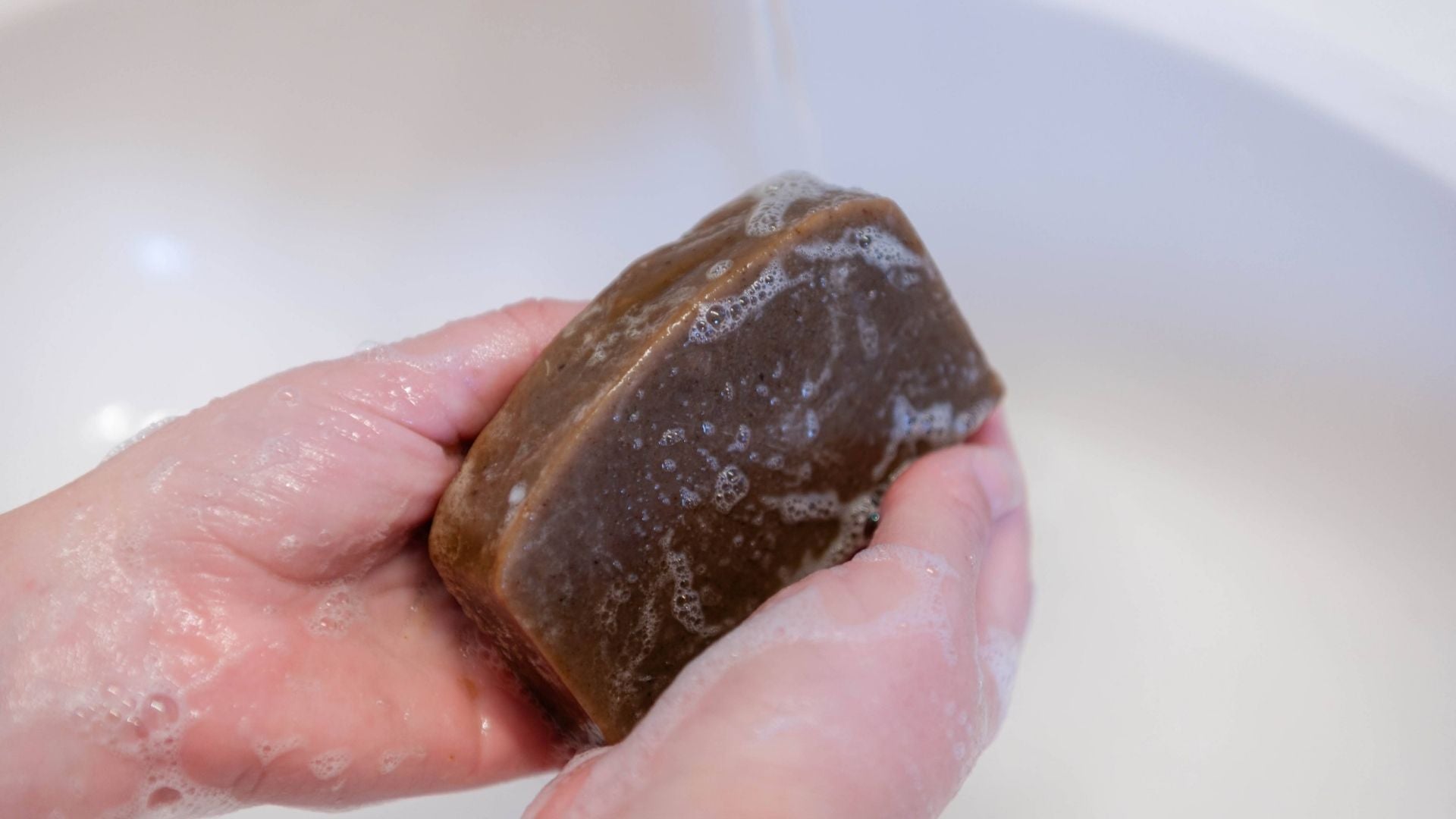
Not bothered with dry, itchy skin
"This soap is so good. It lathers great and keeps my skin moisturized between showers. Being older with dry skin the winter weather can really make my skin really uncomfortable. Not any more!! With this goat milk soap I no longer have to be bothered with dry, itchy skin. I have used other brands of goat milk soap, this is by far the best. The scents are very nice. So glad I found out about Goat Milk Stuff."
Jane M. ✅ Verified Buyer
Shop Now

What are the Benefits of Using Goat Milk Soaps?
Soothes Sensitive Skin Naturally
Gentle formula relieves eczema, psoriasis, and irritation.Deeply Hydrates and Nourishes
Raw goat milk moisturizes without stripping natural oils.Chemical-Free and Natural
Made with food-grade oils, no synthetic detergents.The Goat Milk Soap Difference
Say their skin is healthier since switching to Goat Milk Stuff.
Believe that Goat Milk Stuff has significantly improved the quality of their life.
Enjoy softer skin since starting to use Goat Milk Stuff soaps and lotions.
Results from a Goat Milk Stuff survey with over 1000 responses.
Shop all Goat Milk Stuff
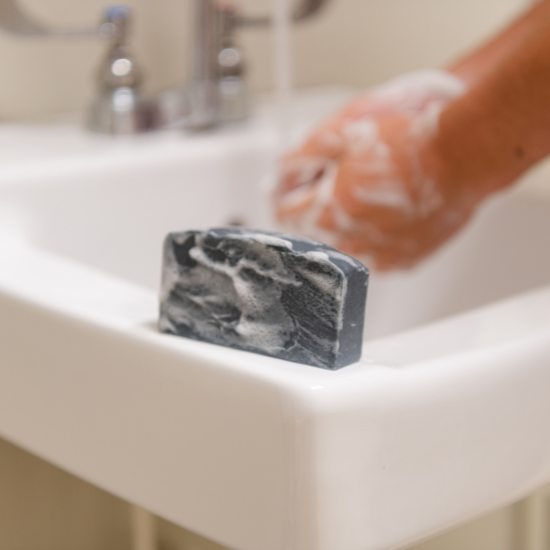
Goat Milk Soap for Healthy Skin
If you’re still using chemical beauty bars or harsh cleansers, with ingredient lists full of words you can’t pronounce, it's time for a change. Our all-natural goat milk soap, made with fresh milk from our own healthy goats, has all of the nourishing ingredients your skin needs, without any of the nonsense.
Switch to our natural goat milk soaps that are great for your face, hands, and body — because healthy skin is happy skin.
We truly believe that the goodness of goat milk can transform and help heal your skin, without any of the harsh chemicals or unnatural ingredients found in most soaps.
Why? Because we’ve seen it work first-hand on our family, friends, and loyal customers. Goat milk soap does more than just clean — it can help heal broken, dry skin as you wash.
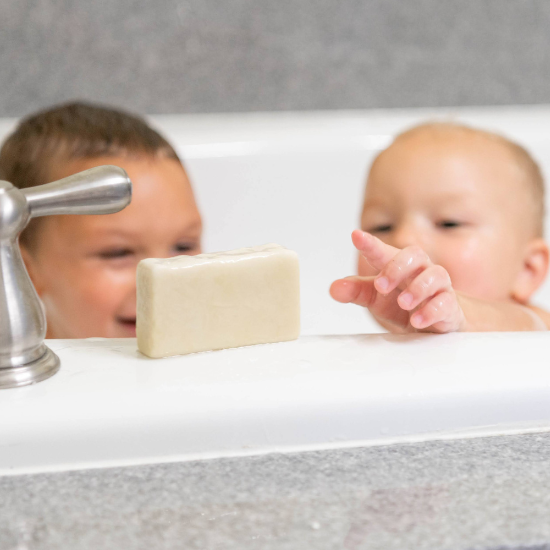
What are the Benefits of Using Goat Milk Soap?
The naturally-occurring lactic acid in goat milk soap naturally exfoliates your skin for a younger look. Goat milk also contains vitamin A which supports the repair of skin that’s been damaged in the sun. Goat milk soap contains no harsh chemicals or detergents, making it a smart alternative to commercial soaps that can leave your skin cracked and malnourished.
Commercial soaps are missing the creamy component of goat milk that’s rich in nourishing antioxidants and good-for-you fatty acids. These ingredients help repair your skin, leaving you with noticeably softer skin. Other soaps may get you clean, but they often dry your skin over time and strip it of its natural moisture. Using goat milk soap is one of the simplest ways to take incredible care of the health of your skin.
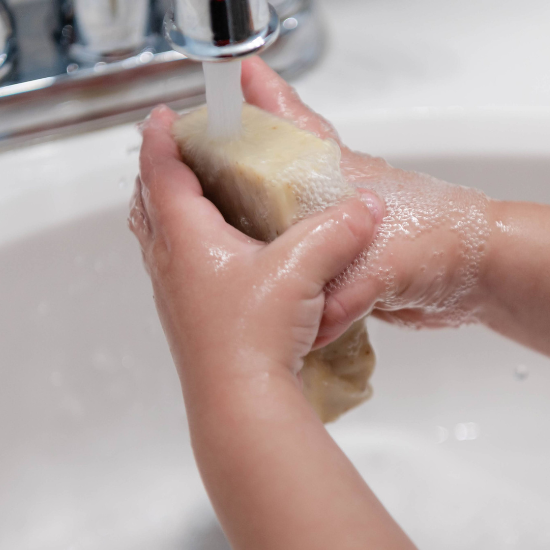
Which Goat Milk Soap Should I Try for My Skin Type?
Goat Milk Soap is great for every skin type, but those struggling with certain conditions may experience more soothing relief from a specific variety.
- Eczema: Try our Purity Goat Milk Soap. This unscented soap with simple and gentle ingredients provides eczema-prone skin with the smooth creaminess of raw goat’s milk.
- Acne: Try our Tea Tree Goat Milk Soap. This soap is our Purity Goat Milk Soap with tea tree essential oil added. Tea Tree has antibacterial and antiviral properties, making it ideal for helping to fight off the infections that are typical with acne.
- Psoriasis: Our Tea Tree Goat Milk Soap can be very effective and is our first recommendation for those looking for relief from psoriasis. But feel free to try our Calendula, Castile, Purity, or Charcoal, as they’ve also helped hundreds of psoriasis patients enjoy clean and clear skin.
- Keratosis Pilaris: We suggest starting with Purity Goat Milk Soap for a nourishing clean. You may also like our Castile Goat Milk Soap. It’s made with only organic extra virgin olive oil and raw goat milk, giving it a lotion-like consistency that’s suitable for hyper-sensitive skin.
- Rosacea: Try our Purity or Tea Tree Goat Milk Soap. Be sure to test it on a small portion of skin first to see if you have any sensitivities, but many people with rosacea have seen positive results.
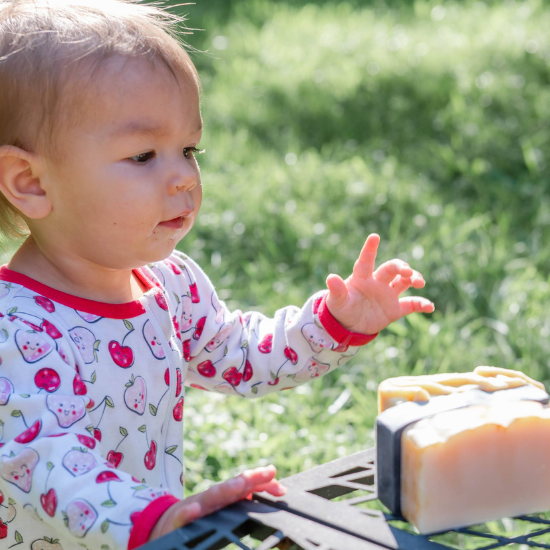
More Skin Types
- Oily Skin: Almost any goat milk soap will do. Many of those who struggle with oily skin love the Tea Tree, Purity, or Lemongrass Goat Milk Soap. Lemongrass essential oil is naturally astringent which can help oily skin and tea tree essential oil may help with acne that results from oily skin.
- Dry Skin: Every goat milk soap contains the same amount of goat milk and they will all help moisturize your skin. If you have any additional skin sensitivities, we recommend starting with our Purity Goat Milk Soap.
- Sensitive Skin: We suggest starting with the Purity or Castile soap for sensitive skin. And we offer travel size goat milk soaps so you can test a small amount of each soap variety before committing to a larger bar.
- Baby Skin: For your little ones, we recommend the Castile Goat Milk Soap, as it is unscented and is our most gentle soap with the fewest amount of ingredients. We recommend using the Castile until infants are at least two months old, which is when we switch our babies to Purity Goat Milk Soap.
- Cancer Patients: Our Castile Goat Milk Soap is a great option to gently care for and cleanse your skin after tough treatments like chemotherapy or radiation.
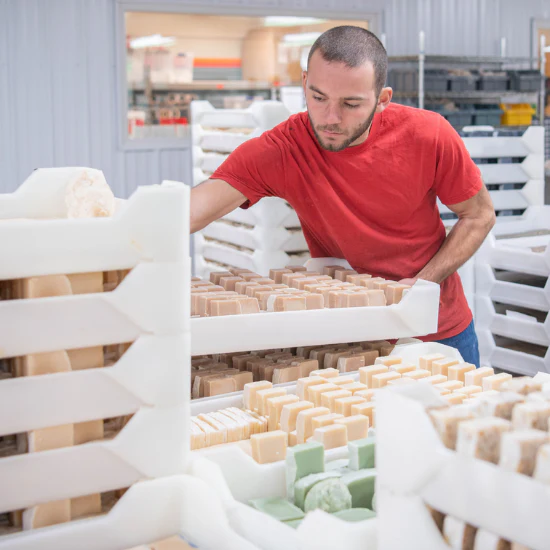
What's Special about Goat Milk Soap from Goat Milk Stuff?
We’ve worked tirelessly since we started making goat milk soap to perfect our products and the positive feedback we’ve received has been tremendous. Those who suffer from skin conditions like eczema, psoriasis, and rosacea have had life-changing results from switching to our goat milk soap. But anyone who’s looking for a gentle and richly-nourishing alternative to harsh commercial soap will notice the difference right away.
Our family works as a team and we’re proud to make all our goat milk soap products right on our family’s farm. We make our soap using the cold processed method which doesn’t subject the soap to any extra forced heat or chemicals. First we mix together a precise, nourishing blend of fats and oils. Then we add the lye (which turns it into soap) along with lots of raw goat milk. Depending on the variety, we also include scent, color, or botanicals to enhance the soap. We never add any harsh chemicals or impurities.
We mix the soap until it starts to thicken, pour it into molds, and let it rest overnight. Once it has hardened, we cut it into individual bars and carefully place the soaps on curing racks where they can get some airflow. After the soap has been cured for six weeks, it is weighed and bagged. At that point it is ready for you to purchase our goat milk soap online and have it delivered right to your door.
People Want to Know...

Is Goat Milk Soap Good for Your Skin?
Yes, Goat Milk Soap hydrates and nourishes, supporting a healthy skin barrier.
Is Goat Milk Soap Good for Your Skin?
Yes! Goat Milk Soap helps replenish your skin’s natural moisture to support a healthy natural skin barrier. Other soaps often dry out your skin in the long run, but Goat Milk Soap is rich in natural nutrients that keep your skin feeling soft, supple, and youthful.

Where Can I Buy Goat Milk Soap?
Buy Goat Milk Soap online or at our Scottsburg, Indiana Farm Store.
Where Can I Buy Goat Milk Soap?
You can purchase Goat Milk Soap on our website. We quickly ship it directly from our farm to your doorstep, and even have a handy autoship option to put your deliveries on autopilot. If you are near the farm in Scottsburg, Indiana, you can also visit our Farm Store to purchase your soap and see some of the goats!

Does Goat Milk Soap Lather?
Yes, Goat Milk Soap lathers well, especially non-olive oil varieties.
Does Goat Milk Soap Lather?
Goat Milk Soap lathers quite well, and is a natural moisturizer that deeply hydrates the skin. Our olive oil-based soaps (Castile and Calendula) lather less than our other varieties of Goat Milk Soap, so if you’re looking for a soap with lots of suds, there are many to choose from. Remember that other factors affect how well your soap lathers. Soft water creates better soap lather than hard water. If there is excess dirt, food, or debris on your hands, it will also prevent your soap from lathering well. If your hands are extra dirty, you’ll notice a difference between the lather from your first wash and the lather from a repeat handwashing.

What Is Goat Milk Soap Good For?
Goat Milk Soap soothes sensitive skin, hydrates, and gently exfoliates.
What Is Goat Milk Soap Good For?
Goat Milk Soap provides a multitude of benefits for your skin. Those with sensitivities or skin conditions use Goat Milk Soap as it doesn’t irritate or aggravate the symptoms of conditions like eczema, acne, psoriasis, and many more. Our wide variety of Goat Milk Soap products, from soap bars to liquid hand soaps to even laundry soap, helps your skin maintain its natural moisture instead of drying it out. The soaps form a rich lather that gently exfoliates the skin, making it a great alternative to commercial soaps that strip the skin of its natural hydration.

How Do You Make Goat Milk Soap?
Cold-processed with raw goat milk, oils, lye; cured six weeks.
How Do You Make Goat Milk Soap?
We make our soap using the cold processed method which doesn’t subject the soap to any extra forced heat or chemicals. First we mix together a precise, nourishing blend of fats and oils. Then we add the lye (which turns it into soap) along with lots of raw goat milk. Depending on the variety, we also include scent, color, or botanicals to enhance the soap. We never add any harsh chemicals or impurities. We mix the soap until it starts to thicken, pour it into molds, and let it rest overnight. Once it has hardened, we cut it into individual bars and carefully place the soaps on curing racks where they can get some airflow. After the soap has been cured for six weeks, it is weighed and bagged. At that point it is ready for you to purchase our goat milk soap online and have it delivered right to your door.

Is Goat Milk Soap safe for babies and children?
Yes, Goat Milk Soap is gentle for babies’ sensitive skin.
Is Goat Milk Soap safe for babies and children?
Goat Milk Soap, such as Castile or Purity, uses minimal, natural ingredients like raw goat milk and organic oils, making it safe for babies and children. Parents report significant eczema relief in infants after just one use, with no irritation from fragrances or chemicals, offering peace of mind for natural childcare.
